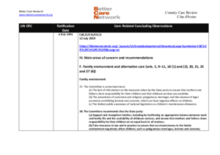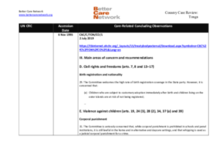Displaying 151 - 160 of 625
The National Quality Improvement Center for Adoption and Guardianship Support and Preservation (QIC-AG) is a five-year project working with eight sites that will implement evidence-based interventions or develop and test promising practices which if proven effective can be replicated or adapted in other child welfare jurisdictions. This webinar presented learning from the project related to staffing and staff support, recruitment and retention, cost/sustainability, stakeholder collaboration, and logistics.
This article explores the findings of a study on the role of the social worker in adoption with a focus on ethics, concentrating on the perspectives of adopted people, birth parents, and adoptive parents.
This radio segment from the program 'This American Life' tells the story of Shamyla, who grew up as the adoptive child of her aunt and uncle in the United States but whose biological parents in Pakistan wanted her back in their care.
In this article, the authors present some results from the first qualitative study that explores the experiences of some Chilean adults who were adopted and searched for their origins in Chile through the National Service of Minor's Search for Origins Program.
In the present report, the UN Special Rapporteur on the sale and sexual exploitation of children, including child prostitution, child pornography and other child sexual abuse material, describes the activities undertaken in relation to the discharge of her mandate since her previous report to the United Nations General Assembly. The report presents a thematic study on safeguards for the protection of the rights of children born from surrogacy arrangements, highlighting the rights of the child to identity, access to origins and to a family environment.
This country care review includes the care-related Concluding Observations adopted by the Committee on the Rights of the Child.
This study sought to understand how post‐institutionalized children interact with unfamiliar peers and the factors that predict the quality of these interactions in order to shed light on the processes contributing to the persistent, often increasing social deficits seen in post‐institutionalized children.
The aim of this article is to raise the voices of a group of birth mothers, a historically stigmatised, powerless and neglected group, with substantial experience of counselling following the loss of a child.
In this chapter of Filiation and the Protection of Parentless Children, the author shows the ways in which premodern Muslim jurists and judges (with focus on early modern Egypt) were able to circumvent the prohibition of adoption through discursive moves and practices, which helped create a family life for many parentless and non-biological children.
This country care review includes the care-related Concluding Observations adopted by the Committee on the Rights of the Child.



